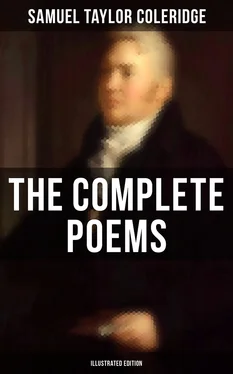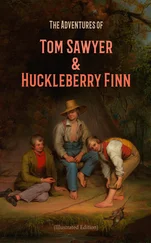Making report of an invisible breeze
That was its wings, its chariot and its horse,
Its playmate, rather say, its moving soul."
Ibid. p. 143.]
Luther—a hero, fettered, indeed, with prejudices—but with those very fetters he would knock out the brains of a modern Fort Esprit .
Comment. Frightening by his prejudices, as a spirit does by clanking his chains.
Not only words, as far as relates to speaking, but the knowledge of words as distinct component parts, which we learn by learning to read—what an immense effect it must have on our reasoning faculties! Logical in opposition to real.
1797-1801
Children, in making new words, always do it analogously. Explain this.
Hot-headed men confuse, your cool-headed gentry jumble. The man of warm feelings only produces order and true connection. In what a jumble M. and H. write, every third paragraph beginning with "Let us now return," or "We come now to the consideration of such a thing"—that is, what I said I would come to in the contents prefixed to the chapter.
Dec. 19, 1800
The thin scattered rain-clouds were scudding along the sky; above them, with a visible interspace, the crescent moon hung, and partook not of the motion; her own hazy light filled up the concave, as if it had been painted and the colours had run.
"He to whom all things are one, who draweth all things to one, and seeth all things in one, may enjoy true peace of mind and rest of spirit."—Jeremy Taylor's Via Pacis .
To each reproach that thunders from without may remorse groan an echo.
A prison without ransom, anguish without patience, a sick bed in the house of contempt.
To think of a thing is different from to perceive it, as "to walk" is from to "feel the ground under you;" perhaps in the same way too—namely, a succession of perceptions accompanied by a sense of nisus and purpose.
Space, is it merely another word for the perception of a capability of additional magnitude, or does this very perception presuppose the idea of space? The latter is Kant's opinion.
A babe who had never known greater cruelty than that of being snatched away by its mother for half a moment from the breast in order to be kissed.
To attempt to subordinate the idea of time to that of likeness.
Every man asks how ? This power to instruct is the true substratum of philosophy.
Godwin's philosophy is contained in these words: Rationem defectus esse defectum rationis .—Hobbes.
Hartley just able to speak a few words, making a fire-place of stones, with stones for fire—four stones for the fire-place, two for the fire—seems to illustrate a theory of language, the use of arbitrary symbols in imagination. Hartley walked remarkably soon and, therefore, learnt to talk remarkably late.
Anti-optimism! Praised be our Maker, and to the honour of human nature is it, that we may truly call this an inhuman opinion. Man strives after good.
Materialists unwilling to admit the mysterious element of our nature make it all mysterious—nothing mysterious in nerves, eyes, &c., but that nerves think, etc.! Stir up the sediment into the transparent water, and so make all opaque.
1797-1801
As we recede from anthropomorphism we must go either to the Trinity or Pantheism. The Fathers who were Unitarians were anthropomorphites.
EGOTISM January 1801
Empirics are boastful and egotists because they introduce real or apparent novelty, which excites great opposition, [while] personal opposition creates re-action (which is of course a consciousness of power) associated with the person re-acting. Paracelsus was a boaster, it is true; so were the French Jacobins, and Wolff, though not a boaster, was persecuted into a habit of egotism in his philosophical writings; so Dr. John Brown, and Milton in his prose works; and those, in similar circumstances, who, from prudence, abstain from egotism in their writings are still egotists among their friends. It would be unnatural effort not to be so, and egotism in such cases is by no means offensive to a kind and discerning man.
Some flatter themselves that they abhor egotism, and do not suffer it to appear primâ facie , either in their writings or conversation, however much and however personally they or their opinions have been opposed. What now? Observe, watch those men; their habits of feeling and thinking are made up of contempt , which is the concentrated vinegar of egotism—it is lætitia mixta cum odio , a notion of the weakness of another conjoined with a notion of our own comparative strength, though that weakness is still strong enough to be troublesome to us, though not formidable.
"—and the deep power of Joy
We see into the Life of Things."
THE EGO
By deep feeling we make our ideas dim , and this is what we mean by our life, ourselves. I think of the wall—it is before me a distinct image. Here I necessarily think of the idea and the thinking I as two distinct and opposite things. Now let me think of myself , of the thinking being. The idea becomes dim, whatever it be—so dim that I know not what it is; but the feeling is deep and steady, and this I call I —identifying the percipient and the perceived.
"O Thou! whose fancies from afar are brought."
March 17, 1801, Tuesday
1797-1801
Hartley, looking out of my study window, fixed his eyes steadily and for some time on the opposite prospect and said, "Will yon mountains always be?" I shewed him the whole magnificent prospect in a looking-glass, and held it up, so that the whole was like a canopy or ceiling over his head, and he struggled to express himself concerning the difference between the thing and the image almost with convulsive effort. I never before saw such an abstract of thinking as a pure act and energy—of thinking as distinguished from thought.
GIORDANO BRUNO
Monday, April 1801, and Tuesday, read two works of Giordano Bruno, with one title-page: Jordani Bruni Nolani de Monade, Numero et Figurâ liber consequens. Quinque de Minimo, Magno et Mensurâ. Item. De Innumerabilibus Immenso, et Infigurabili seu de Universo et Mundis libri octo. Francofurti, Apud Joan. Wechelum et Petrum Fischerum consortes , 1591.
Then follows the dedication, then the index of contents of the whole volume, at the end of which index is a Latin ode, conceived with great dignity and grandeur of thought. Then the work De Monade, Numero et Figurâ, secretioris nempe Physicæ, Mathematicæ, et Metaphysicæ elementa commences, which, as well as the eight books De Innumerabili , &c., is a poem in Latin hexameters, divided (each book) into chapters, and to each chapter is affixed a prose commentary. If the five books de Minimo , &c., to which this book is consequent are of the same character, I lost nothing in not having it. As to the work De Monade , it was far too numerical, lineal and Pythagorean for my comprehension. It read very much like Thomas Taylor and Proclus, &c. I by no means think it certain that there is no meaning in these works. Nor do I presume even to suppose that the meaning is of no value (till I understand a man's ignorance I presume myself ignorant of his understanding), but it is for others, at present, not for me. Sir P. Sidney and Fulk Greville shut the doors at their philosophical conferences with Bruno. If his conversation resembled this book, I should have thought he would have talked with a trumpet.
The poems and commentaries, in the De Immenso et Innumerabili are of a different character. The commesntary is a very sublime enunciation of the dignity of the human soul, according to the principles of Plato.
Читать дальше












